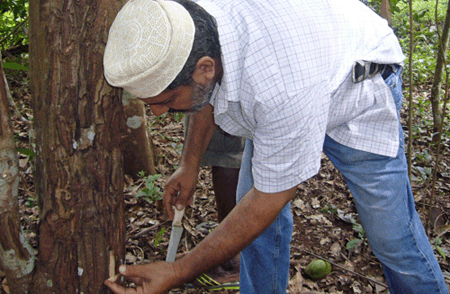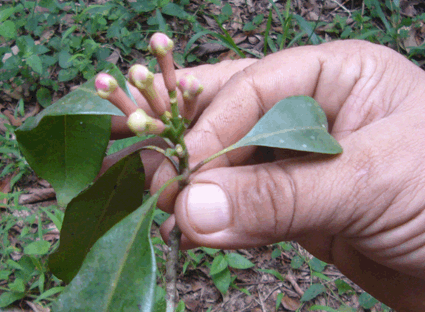Spice farm visit in Zanzibar- A natural supermarket
Spice farm visit in Zanzibar- A natural supermarket
Now he owns the farm and it is providing him a variety of products amongst others fruits, spices and medicines. We stop at a tree and with his huge knife he cuts some chunk of the crust. He hands me the piece to taste and my taste buds are overwhelmed with the flavor of cinnamon. We continue our walk. Mangos, lemons, oranges, bananas, jack fruits, coconuts and beehives are high up in the trees, while ginger is sprouting in the humid soil. Nutmeg, vanilla, cacao and black peppers are growing in trees. We also come across a small plot of coffee trees. Proudly he tells me that he is growing the Arabica beans, which can be sold at high prices to the Middle East.

It is overwhelming how many species are to be found in the small distance we covered. It feels like I am literally walking through a natural supermarket. Mr. Yusuf tells me there are about 130 different types of plants and trees on his farm. Besides fruits and spices, this traditional production system is also providing medicine. Mr. Yusuf picks some leaves and crushes them. "These leaves will cure diabetes, and can be helpful to tackle women's problems". I ask him how and where he gained all this knowledge. "I did not gain this knowledge from any textbook, but I was taught by my father who again learned from his father. It is passed from generation to generation".
While walking through this spice farm, or rather I would say 'spice forest', I think how Mr. Yusuf can be an inspiration to other farmers as this traditional system is both conserving biodiversity and at the same time providing income opportunities for him and his family. Besides planting spices, coffee and fruits, he also introduces certain trees that promote natural pest control, soil stability and watershed protection, while others provide shade. This system ensures that Mr. Yusuf doesn't rely on any chemical inputs. When I ask him about the problem of deforestation on the island, he tells me that often sales men come to his land to offer him money for his centuries- old trees. However, he sends them home as he will never let anyone cut his trees; "Trees are a source of life and you actually kill me if you kill one of my trees ".

While drinking my fresh coconut water, fetched by one of the kids, I realize that Mr. Yusuf is the living proof that maintaining biodiversity and promoting economic activities can go hand in hand. These kinds of inspiring practices should serve as example to other farmers and to policy makers who develop agricultural policies in their offices far away from the field and this reality, not even aware of the existence of Mr. Yusuf. I end my field visit with my bag filled with spices, like curry and tumeric. When I will prepare my curry back home, I will remember Mr. Yusuf and his exciting story for sure!
Read more about this subject
-
 Blog / 10 February 2016
Blog / 10 February 2016





